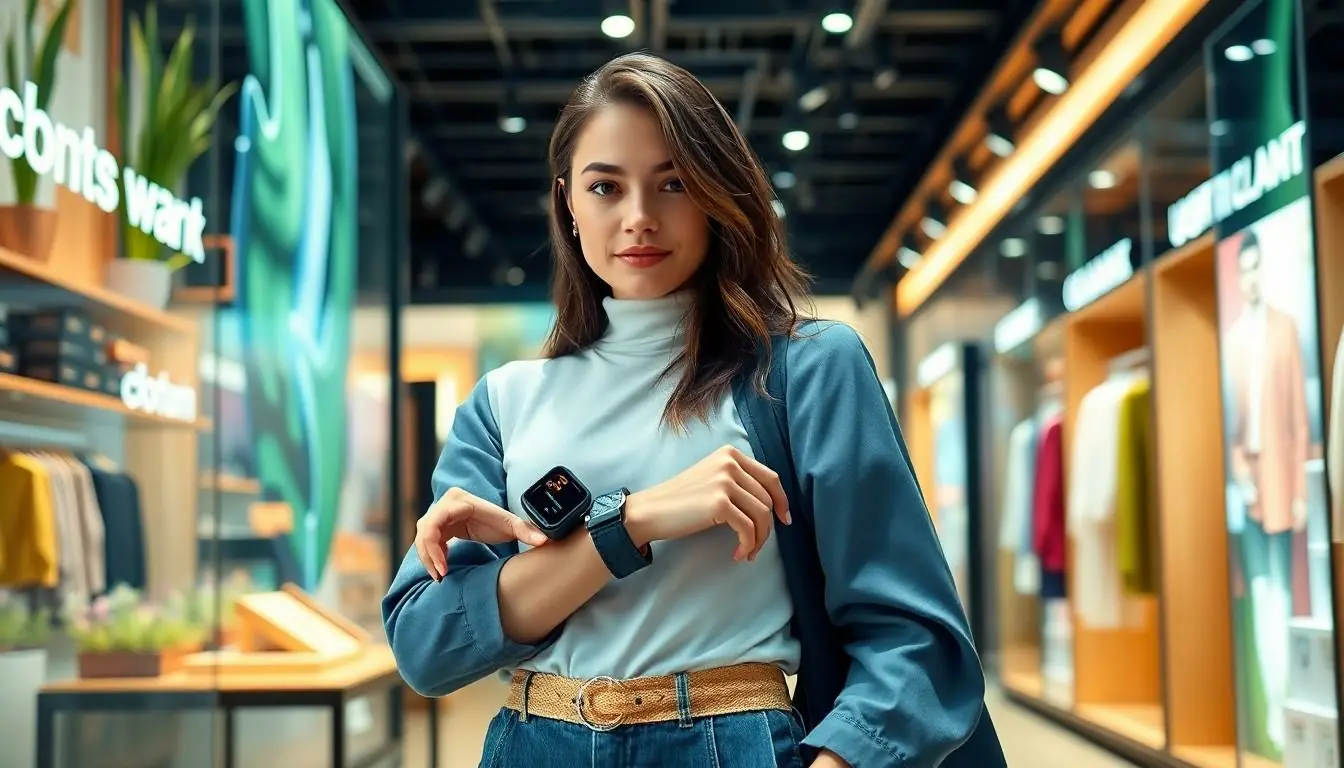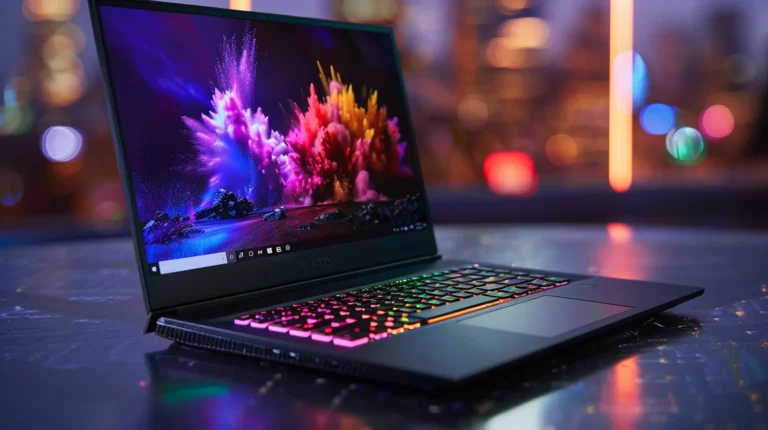In a world where fashion meets technology, the runway isn’t just for models anymore; it’s also for gadgets and innovations that are changing the way we dress. Imagine a wardrobe that can suggest outfits based on your mood or a pair of shoes that tracks your steps while looking fabulous. Welcome to the exciting realm of fashion technology news, where style and smart collide in the most delightful ways.
Table of Contents
ToggleOverview Of Fashion Technology News
Fashion technology news showcases the rapid advancements in apparel innovation and smart textiles. Innovations enhance user experience and promote sustainability, addressing consumer needs effectively. Companies leverage artificial intelligence to create personalized shopping experiences. Data-driven algorithms analyze consumer preferences, improving fashion recommendations.
Wearable technology gains traction with products like fitness-tracking smartwatches and smart clothing. Smart fabrics monitor health metrics, pushing the boundaries of functionality in everyday wear. Brands explore virtual fitting rooms, allowing customers to try on outfits digitally. These innovations cut down on returns and elevate customer satisfaction.
Mobile shopping apps continue to evolve, incorporating features that enhance user engagement. Augmented reality integration allows users to see how items fit in their space. Retailers utilize chatbots for real-time customer service, streamlining the shopping process.
Sustainability also plays a critical role in fashion technology. Biodegradable textiles and ethically sourced materials gain prominence as brands adopt more eco-friendly practices. Transparency in sourcing and production now influences purchasing decisions. Technologies like blockchain enhance traceability, assuring consumers of their choices.
Fabrication techniques evolve with 3D printing, enabling custom designs and reducing waste. This method allows for on-demand production, minimizing overstock issues. Startups and established brands alike experiment with innovative approaches to manufacturing.
The future of fashion technology anticipates further integration of AI and machine learning, refining personalization. Enhanced virtual experiences promise to reshape the shopping landscape. Emerging trends suggest a continuous blending of style, comfort, and smart features.
Latest Innovations In Fashion Technology

Innovations in fashion technology are evolving rapidly, merging creativity with functionality. New developments enhance user experience while promoting sustainability across the industry.
Smart Fabrics And Wearables
Smart fabrics are revolutionizing the apparel industry by incorporating technology directly into textiles. Wearable devices, such as smartwatches and health-monitoring garments, provide real-time data on fitness and wellness. Companies are investing in fabrics that adapt to various conditions, allowing for improved comfort and performance. These textiles can change properties based on temperature or moisture levels, offering a customized wearing experience. Integrating sensors into clothing enables monitoring of health metrics, helping consumers make more informed lifestyle choices. Fashion brands are increasingly collaborating with tech firms to create innovative pieces that combine style with practicality.
3D Printing In Fashion
3D printing technology has transformed how fashion designers create and produce garments. This method allows for rapid prototyping and the production of intricate designs that traditional techniques struggle to achieve. Designers can now create customized items on demand, reducing waste and minimizing excess inventory. With 3D printing, consumers receive uniquely tailored pieces that cater to individual preferences and sizes. Major fashion brands are embracing this technique to streamline their production processes and embody sustainability. Furthermore, 3D-printed accessories are gaining popularity, offering endless customization options while maintaining style. This technology is set to redefine the landscape of fashion production, emphasizing efficiency and creativity.
Impact Of Fashion Technology On Sustainability
Fashion technology significantly impacts sustainability by driving innovations across materials and production methods. Developments in this area focus on reducing waste and environmental harm while promoting a more responsible approach within the industry.
Eco-Friendly Materials
Innovative textiles combine sustainability with functionality. Brands increasingly use biodegradable fabrics derived from organic sources, such as hemp and organic cotton. Recycled materials also gain popularity, with products crafted from post-consumer plastics effectively reducing landfill waste. Additionally, advancements in plant-based leathers offer viable alternatives to animal products, further minimizing ecological footprints. These eco-friendly materials align with consumer demand for transparency and ethical sourcing, encouraging a shift toward greener product lines.
Circular Fashion Initiatives
Circular fashion initiatives aim to create systems that extend the lifecycle of garments. Companies prioritize recycling and upcycling programs, promoting the return and repurposing of clothing. Platforms facilitate garment swaps, reducing the need for new purchases while fostering community engagement. Innovations in design, such as modular clothing that allows for easy repair and customization, contribute to sustainability goals. Data tracking through blockchain also enhances transparency in production processes, ensuring responsible sourcing at every stage. These initiatives collectively work toward a more circular economy within the fashion sector.
Future Trends In Fashion Technology
The fashion industry continuously evolves, driven by emerging technologies that redefine consumer experiences and sustainable practices.
Artificial Intelligence And Personalization
Artificial intelligence significantly enhances personalization in fashion. Algorithms analyze consumer preferences, providing tailored shopping experiences. This technology recommends clothing based on past purchases, style trends, and mood assessments. Brands utilize AI to predict fashion trends, enabling timely responses to market demand. Integration of AI chatbots in shopping applications fosters real-time assistance, improving customer interaction. Data-driven insights allow retailers to stock items more efficiently, minimizing waste. Overall, these advancements create a more engaging and customized shopping environment.
Virtual Reality And Augmented Reality In Retail
Virtual reality and augmented reality reshape retail experiences. Virtual fitting rooms enable customers to try on clothes digitally, reducing return rates and enhancing satisfaction. Augmented reality apps overlay digital images of clothing onto real-world settings, allowing for informed purchasing decisions. Retailers adopt these technologies to create immersive environments that captivate shoppers. Enhanced interactivity encourages customers to explore products in new ways. These innovations not only streamline shopping but also build deeper connections between brands and consumers, ultimately revolutionizing how fashion is experienced.
Fashion technology is undeniably shaping the future of the industry. With innovations like smart textiles and AI-driven personalization, the way consumers interact with fashion is evolving rapidly. Virtual fitting rooms and augmented reality are enhancing shopping experiences while promoting sustainability through responsible sourcing and production methods.
As brands continue to embrace 3D printing and eco-friendly materials, the focus on reducing waste and enhancing transparency becomes paramount. The integration of technology into fashion not only addresses consumer demands but also fosters a deeper connection between brands and their audience.
Looking forward, the continuous advancements in fashion technology promise to create a more personalized and sustainable landscape, ensuring that style and functionality go hand in hand. The future is bright for fashion enthusiasts and tech lovers alike.





